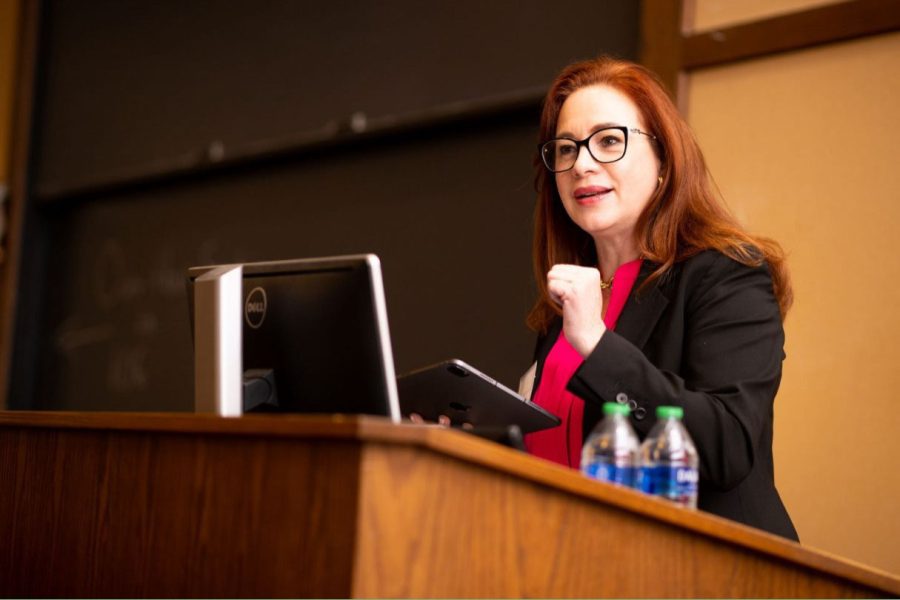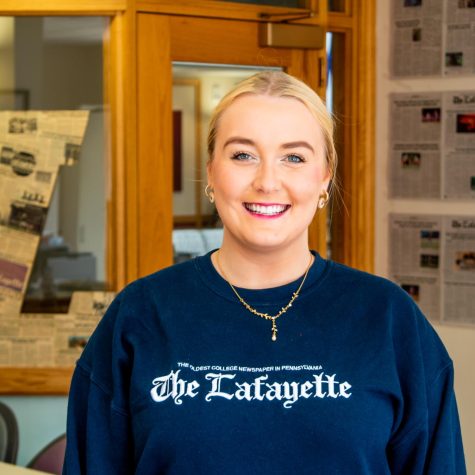Last Tuesday evening, Lafayette College welcomed Maria Fernanda Espinosa Garcés, the former president of the United Nations General Assembly, to the packed Kirby Hall of Civil Rights.
Espinosa Garcés was invited to Lafayette by the International Affairs program as the speaker for this year’s Robert ’69 and Margaret Pastor Lecture in International Affairs. The lecture, entitled “Reimagining the Future of World Affairs,” focused on recent global crises, with Espinosa Garcés identifying where the United Nations (UN) has struggled and galvanizing students to realize their own power and importance in addressing global issues.
“I am [a] strong believer in the transformational power of the younger generation,” she said to a crowd of mostly students.
Espinosa Garcés, the first Latina and fourth woman to lead the General Assembly, first spoke about the centrality of fieldwork in shaping her personal and political development, noting her youthful hopes of saving the rainforest.
“[The Amazon] is the place where I learned the most, more than in any classroom,” she said.
After studying in the Amazon, Espinosa Garcés would have a distinguished academic career – she has published over 30 academic articles.
She identified climate change and water scarcity as two pressing global issues, saying, “we have trespassed the planetary boundary on water.”
Beyond these issues, Espinosa Garcés also expressed her belief that society faces “multiple and compounding crises” extending from the pandemic to extreme poverty and gender inequality, noting that “before we reimagine the future, we need to understand what is happening today.”
Espinosa Garcés, who was the first woman to serve as Permanent Representative of Ecuador to the United Nations in New York, said that “the highest price is always paid by the most vulnerable,” including women, children, indigenous people, people with disabilities and elderly people.
Espinosa Garcés was also transparent in her belief that progress on UN objectives like the Sustainable Development Goals and Paris Agreement has been far from optimal, at one point stating that “we see that the outlook is bleak, and we know it.”
“These are not the problems, these are the symptoms of a more profound and systemic civilizational breakdown that … requires a multinational and multilateral response,” Espinosa Garcés said. “These are problems that need you.”
In discussing potential solutions to these issues, Espinosa Garcés appeared to maintain an abundance of hope, noting the centrality of young people in the world’s formulation of a “new social contract.”
“We need to transform our institutions, strengthen our democracies, reassert our values, to be societies that are more human, less unequal, that can be respecting the planetary values,” Espinosa Garcés said. “No country … can face these multiple crises on its own.”
She also highlighted the UN’s upcoming Summit of the Future in 2024, as well as the UN’s Office of the Secretary-General’s Envoy on Youth.
“You have a home at the UN,” she said to the students.
In addition to her UN career, Espinosa Garcés had stints as both Ecuador’s minister of foreign affairs and of national defense. She spent her day at Lafayette prior to her lecture meeting with capstone students and Model UN club members, international affairs professor Caleb Gallemore’s classes, and eating dinner with select students and guests.
Anna Fenkel ‘25, a student in one of Gallemore’s classes, was present for one of Espinosa Garcés’ classroom visits and spoke with her directly after class. Fenkel noted that Espinosa Garcés revealed the Ecuadorian press had “bashed her” as “underqualified” when she was appointed minister of defense because she was also a poet.
“It really stuck with me,” Fenkel said. “They … deliberately ignored all of her other qualifications. I asked her how … [she] dealt with that and she said … that her work should speak for itself.”
“Speaking to her really inspired me,” Fenkel added.
Espinosa Garcés said in the lecture that “we want basically the same things out of life at the end of the day, more or less.”
“We need to fight for that because it’s not a given,” Espinosa Garcés said.
Trebor Maitin ’24 contributed reporting.






































































































